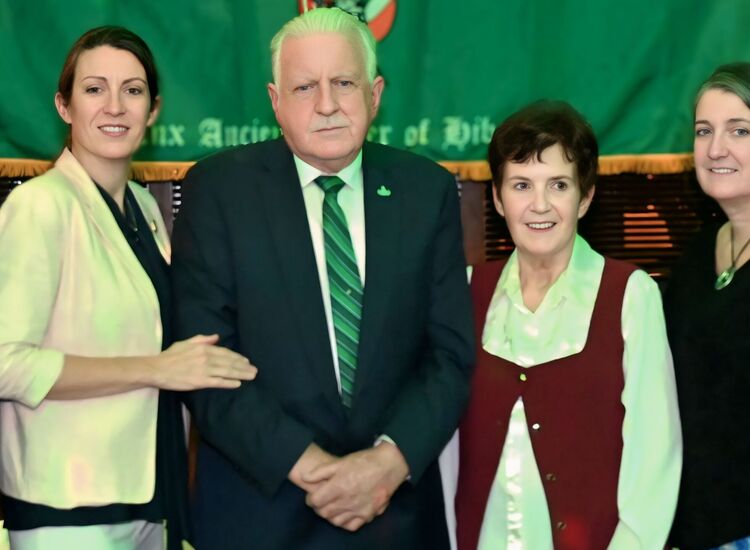Birgit Huppuch and Michael Laurence in “Poison,” presented
by Origin Theatre Company at the Beckett Theatre
PHOTO BY LOU MONTESANO
By Orla O’Sullivan
A couple talks for the first time since he walked out on her 10 years ago—nine, he keeps reminding her, at their meeting in the cemetery where their only child is buried.
This petty and repeated disagreement is one of many details in the writing, that, along with superb acting make the characters in “Poison”—which opens tonight—highly believable.
Yet the play, an international hit by acclaimed Dutch playwright Lot Vekemans and starring OBIE-winner Birgit Huppuch with Drama Desk nominee Michael Laurence, is much more than an examination of a doomed pairing, as one might deduce from the marketing materials.
Although it’s about a couple who responded radically differently to the death of their child, so much that it cleaves them apart, it presents issues to which all can relate. Among them, how men and women misunderstand each other and how each of us must find an answer to the question: How do you get on your feet again after a loss? In various ways, including quite literally, it asks, Can you sing in the face of death?
“Poison” opens unusually in that an actor is on stage before the play begins. This man waiting, somewhere nondescript looks out at the audience, concerned, slightly pacing, intermittently checking his phone. Suddenly, from behind, the beautiful voice of a classical soloist fills the air (tenor Jordan Rutter, a proxy for feeling, resilience and communication).
Also unusual is the cadence of this play. Most build to a climax, then end. Here, there are waves of ups and down, maybe an echo of coupledom itself, the question always lying below: Should I stay or should I go?
There’s a certain discomfort in being stuck with this couple that makes the 90 minutes at times seem long, although ultimately very satisfying.
“Poison” is down-to-earth and often funny in the course of provoking big thoughts. The man (an everyman proxy named simply “he”) describes his conflicted state, having left the woman (“she”) on New Year’s Eve. He felt weird not to be in touch on such an occasion, even as he crossed the border. “I said, to myself, ‘f***ing idiot, you up and leave on a day like today and then you phone her at midnight?!’”
Theirs is a very classical male-female pattern, even down to her overstating how long they have been apart, versus his inclination to be somewhere between matter-of-fact and understated.
He characterizes them this way. “We’re a man and a woman who lost a child and then each other, or, maybe I should say, who lost themselves and then each other.”
She sarcastically deems that “very clear and concise summary of us” as in keeping with his “detached, journalistic, male” ways.
Initially, she is so angry and provocative, she is hard to take. At one point, after he steps out, she seems even more enflamed. “Did anything happen while I was gone?” he asks “Loads of shit!” she yells, waving her arms, in reference to the past 10—nine—years. “No, I mean, since I went for a walk,” he deadpans.
It’s a laugh out loud moment, but his claim to be the reasonable party gets undercut, when they let tenderness in and start to see that each merely acted on instinct. Her classically female reaction was to sit with the feelings, to the point of wallowing and martyrdom (at one point she lies down on the cemetery grounds.) His classically male reaction was to run from feeling: he emigrates and literally takes up running. She devalues his response as unfeeling while he, rightly, dubs her “bitter.” The play’s best moments are when he finally shows his emotion and unveils several secrets, under Erwin Maas’s sure direction.
Each must find some middle course. They help each other do so, enough that by the end they have in a sense traded places.
“Poison,” by Lot Vekemans, translated by Rina Vergano, is presented by Origin Theatre Company at the Beckett Theatre, 410 West 42nd St. until Dec. 11. Tickets from www.origintheatre.org.
Clinging to grief’s illusion
The Origin Theatre Company’s George Heslin, left, discusses “Poison” with
playwright Lot Vekemans and director Erwin Maas after a preview performance.
PHOTO: ORLA O’SULLIVAN
By Orla O’Sullivan
“In my work, there’s always something really bad happening, somebody dying—”
“—Like the election!” George Heslin, founder and artistic director of Origin Theatre interjected, as Dutch playwright Lot Vekemans discussed her play that Origin had brought to New York on the week of the presidential election of Donald Trump.
Vekemans is regarded as one of the Netherlands’ foremost playwrights and, “Poison,” now in preview at Theatre Row, off Times Square, as one of the country’s foremost theatrical exports. An English translation of the 2007 work has since played across Europe, in Russia and South America, and it’s now on its way to China and South Africa. (It was noted that, at readings in South Africa, audiences assumed this play—about a couple whose relationship sundered after they lost a child—was a political metaphor for South Africa after apartheid.)
Vekemans met Heslin’s levity with seriousness, as she expounded in a Q&A following last Saturday’s performance, on her view of the relationship between fate and free will. “It’s relevant to today: what do you do when something really bad happens? I’m convinced fate is there to make us choose, to make new decisions.”
Although her play concerns a couple who respond radically differently to the death of their child, it poses a question to which, she said, all could relate: “How do you deal with grief or loss and get on your feet again?”
In “Poison,” as with her other plays, she said, “One of my characters must be someone I do not understand.” In this case, why did the mother stay stuck, buried under her grief, a decade on?
She concluded,” Grief gives us the illusion we are still connected to the thing we have lost. She has the feeling if she would give that up she would lose the child a second time.”
Director Erwin Maas told of a coincidence. Not knowing that the Dutch production incorporated a singer, he did the same for the New York production.
It’s fitting since the play asks in various ways: Can you sing in the face of death.
Tenor Jordan Rutter, who beautifully performed German romantic pieces, including Bach’s Passion of St. Matthew, noted, “Oddly, there’s plenty of music about dead children in the classical canon.”
However, “Poison” opened with Strauss’s “Morgen,” meaning both “morning” and “tomorrow,” to reflect the director’s optimism. “This play is mostly about hope,” Maas said, “if you see where the characters start and where they end.”









